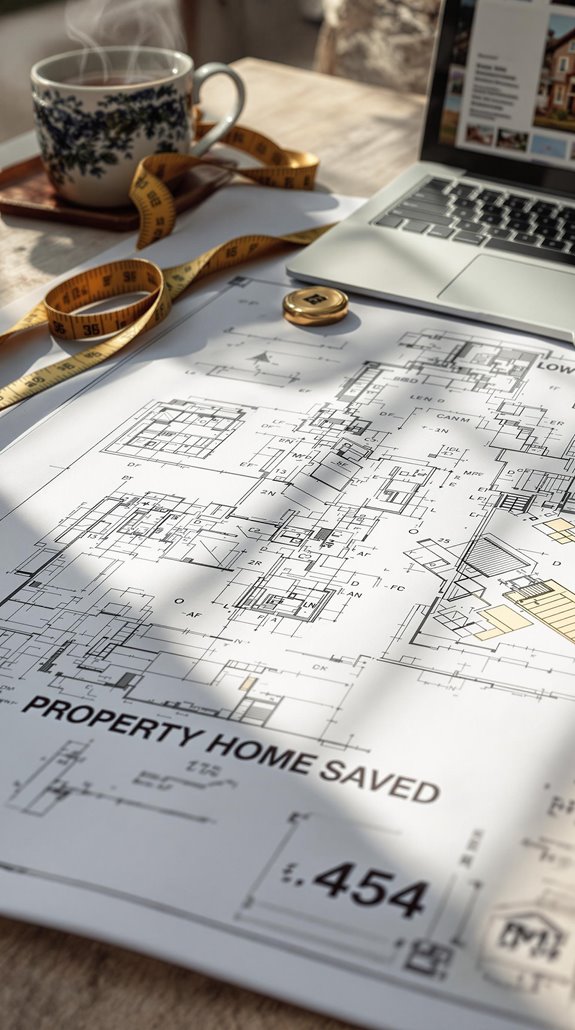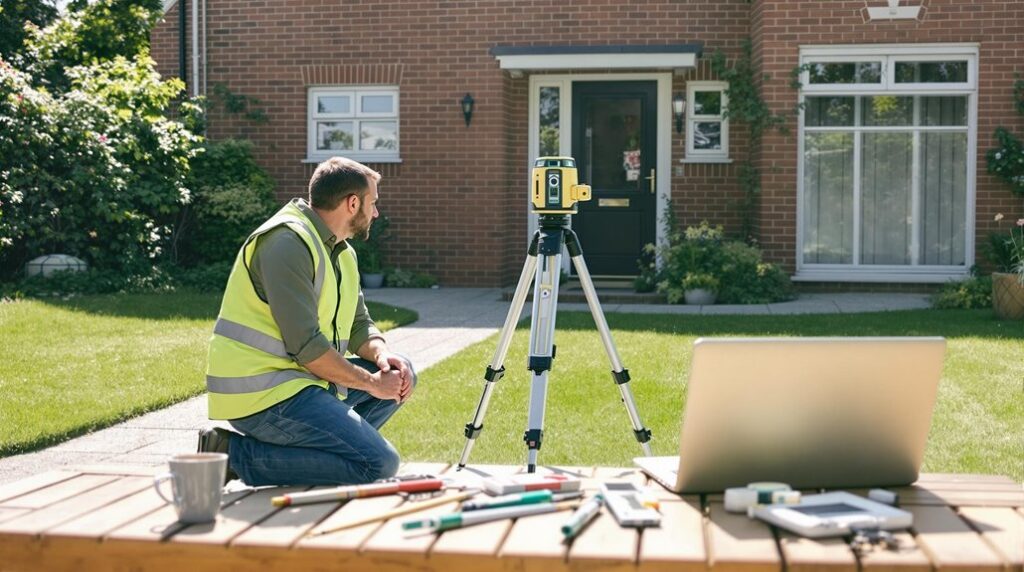I’ll walk you through the exact costs you can expect for a Level 1 survey and show you how to cut those expenses without compromising on quality. Most homebuyers don’t realize they’re overpaying for surveys that exceed their property’s actual requirements, especially when dealing with newer homes. The pricing structure isn’t as straightforward as it appears, and there are specific timing and negotiation tactics that can greatly impact your final bill.
Key Takeaways
- Level 1 surveys cost £300-£900, significantly less than Level 2 (£400-£1,000) and Level 3 (£630-£1,500+) options.
- Book surveys during off-peak months (November-January) and obtain quotes from three or more RICS-qualified surveyors for competitive pricing.
- Choose Level 1 for properties under five years old with modern construction to avoid unnecessary higher-level survey costs.
- Provide existing property documents and clear access paths to improve efficiency and avoid terrain-related surcharges.
- Consider targeted inspections on specific property areas to reduce survey fees by 30-40% compared to full assessments.
Understanding RICS Level 1 Survey Pricing Structure
When you’re planning a property purchase, understanding the RICS Level 1 survey pricing structure helps you budget effectively for this crucial assessment. I’ve found that Level 1 surveys typically cost between £300-£900, with most falling around £400 for what’s fundamentally a condition report.
Your location greatly impacts pricing – London surveys cost more due to higher property values, though increased competition among surveyors can work in your favor. Property value, size, and your chosen surveyor’s experience also influence the final cost. Additionally, it’s wise to consider the estimated costs associated with moving, including other essential expenses that may arise during the transition.
As the most basic RICS survey type, Level 1 represents the most affordable option compared to Level 2 or Level 3 surveys. Keep in mind that Level 1 surveys provide no advice on property issues or valuation, focusing solely on documenting the current condition. I recommend shopping around, especially in competitive markets, to secure the best price while ensuring you’re getting quality assessment from a qualified professional.
Key Factors That Influence Survey Costs
While understanding the basic pricing range helps with initial budgeting, several key factors greatly impact your final Level 1 survey cost. I’ll walk you through what affects pricing so you can estimate more accurately.
Property size matters most—larger homes require longer inspection times, greatly increasing fees. Your property’s age also plays a vital role; older properties demand more thorough assessments due to potential structural issues, making a new build survey even more essential for identifying hidden defects.
Location dramatically influences costs. London and Southeast surveys cost 15-30% more than national averages, while urban centres command premium rates versus rural areas.
Your surveyor’s qualifications affect pricing too. RICS-accredited professionals charge 15-30% premiums for their expertise, though this guarantees quality.
Finally, urgent bookings incur 10-20% rush fees, so booking early saves money. The initial survey cost represents a worthwhile investment when compared to the potential expenses of unexpected repairs discovered later.
Comparing Level 1 Against Other Survey Options
How does Level 1 stack up against other survey options? I’ll break down the key differences so you can make an informed decision.
Cost-wise, Level 1 runs £300–£900, averaging 40–50% less than Level 3’s £630–£1,500+ range. Level 2 sits between at £400–£1,000, costing 25–30% more than Level 1.
The inspection depth varies dramatically. Level 1 provides surface-level review without tests, while Level 2 includes visual inspection of accessible areas like lofts. Level 3 offers thorough structural assessment with material analysis. It’s important to note that the inspection depth significantly influences the overall cost of the survey.
Level 1 works best for new builds or modern homes with minimal defects. Level 2 suits standard properties under 50 years old. Level 3 handles pre-1900 homes, complex structures, or properties with suspected subsidence. Getting quotes from multiple surveyors allows you to compare costs and find the best value for your chosen survey level.
Optimal Scenarios for Choosing Level 1 Surveys
Understanding when Level 1 surveys make the most sense can save you both money and time while still meeting your property assessment needs.
I’d recommend Level 1 surveys for properties under five years old with modern construction using standard materials like brick and tile. They’re perfect when you’re dealing with conventional residential builds without complex alterations or unusual features like timber framing or thatched roofs. Additionally, engaging a chartered surveyor can help ensure that any potential issues are identified early in the process, providing you with peace of mind during your purchase.
You’ll find them most valuable when there’s no history of structural problems, visible defects, or suspected environmental hazards. The faster turnaround and lower cost make them ideal for budget-conscious buyers or urgent transactions.
They work best for new-builds, small uncomplicated properties, and low-risk purchases where you need basic oversight rather than detailed structural advice. Level 1 surveys provide a basic overview of any visible defects, making them suitable for straightforward property assessments.
Strategies to Reduce Your Survey Expenses

Three strategic approaches can markedly reduce your Level 1 survey costs without compromising the quality of your property assessment.
First, I’ll help you leverage timing and negotiation. Book your survey during off-peak months (November-January) to secure 10-15% cost reductions. Always obtain quotes from three or more MRICS-qualified surveyors – this competitive approach typically reduces fees by 10-25%. Use competitive prices from other surveyors for bargaining leverage.
Second, maximize process efficiency by providing existing property documents to avoid redundant checks and clear access paths beforehand to prevent terrain-related surcharges. These simple preparations can save you significant money.
Third, consider targeted inspections if you’re confident about your property’s overall condition. Focusing on specific areas like roofs or foundations reduces fees by 30-40% while addressing your primary concerns effectively.
Conclusion
I’ve shown you that Level 1 surveys offer excellent value at £300-£900 for newer properties. You’ll get the essential information you need without unnecessary complexity or cost. Remember to book during quieter periods, compare multiple quotes, and guarantee easy property access to maximize your savings. If you’re buying a modern home under five years old, this survey type provides the perfect balance of cost-effectiveness and peace of mind for your purchase decision.
References
- https://www.myjobquote.co.uk/costs/surveying-a-house
- https://www.comparemymove.com/guides/surveying/how-much-does-a-house-survey-cost
- https://surveyhut.co.uk/level-2-or-3-home-survey/how-much-does-a-house-survey-cost/
- https://www.mickleson.co.uk/resources/how-much-does-a-home-survey-cost/
- https://hoa.org.uk/advice/guides-for-homeowners/i-am-buying/how-much-does-a-house-survey-cost/
- https://www.rics.org/profession-standards/home-surveys-licences
- https://hoa.org.uk/advice/guides-for-homeowners/i-am-buying/what-sort-of-survey-should-i-have/
- https://www.surveymerchant.com/blog/how-much-does-a-home-report-cost-full-structural-survey-cost-of-rics-building-surveys-the-benefits
- https://www.netlawman.co.uk/ia/house-survey-cost
- https://www.mvsurveying.co.uk/how-much-will-a-survey-cost

